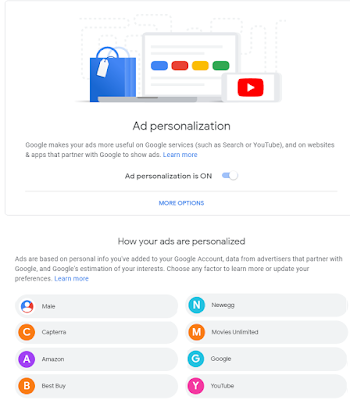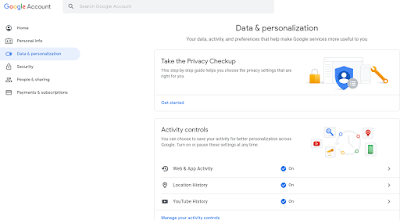You're browsing a web page and suddenly on the right side an ad appears for razors. And yet, you just picked on a pack at the store a few days ago.
True.... you were looking at ordering online at Harrys and Dollar Shave Club but decided on buying a pack locally.
But why are you seeing an advertisement on what you were looking at a few days ago? Is Google reading your mind?
It's called 'Ad Tracking' and, long story short, Google keeps track of your browsing habits very closely.
And this is all for marketing purposes.
Don't want Google snooping into your browsing habits? Here's how you can disable it. All it takes is one click of the mouse and 'Ad Tracking' is disabled.
 1. On your browser log into your Google account if your not already logged in.
1. On your browser log into your Google account if your not already logged in.
2. In the address bar type in https://adssettings.google.com/authenticated
(Note: if you click 'More Options', you'll get a check box allowing Google to use your browsing activity to personalize ads on websites. It's easier just to turn off Ad Personalization altogether)
3. Click the switch to turn off Ad Personalization.
When you turn off Ad Personalization, you'll get a pop-up window essentially asking if you're sure you really want to do this?
Click 'Turn Off'
And that's it.
Turning off Ad Personalization gives a certain level of privacy knowing that Google isn't keeping track of your browsing activities.
Microsoft has had to issue a major warning to all Windows 10 users.
The last update was deleting files.
With update KB4532693 a serious issue was detected with a small group of Windows 10 users, but it's serious involving the loss of some user data such as the desktop and personal files. First off, it’s important to understand that this is simply based on a small but a growing number of user reports.
When it was released on Microsofts "Patch Tuesday", the Windows 10 KB4532693 security update was found to revert certain system settings to their defaults and also removes files from the desktop.
Restoring some files
For many users, Windows 10 has renamed main user profile folder and files can be restored from C:\Users profile folder ending in .000 or .bak name, with new reports of user data being deleted.
The update has now been pulled from Microsofts update page and is no longer available.
https://support.microsoft.com/en-us/help/4524244/security-update-for-windows-10-february-11-2020
This is Part 2 of a 2 part article
Part I here
Privacy
We all value our privacy and for obvious reasons we're not going to post our bank account, address and social security numbers on the internet.
However, you may be surprised or maybe even shocked on just how much information about you can be found on the internet.
Just drop your name on 'Thatsthem.com', 'Spokeo.com' or any other 'People Search" websites and you'll find information about yourself likely you'd rather not have public.
A common thought is that once it's on the internet it's out there forever.
But to a certain extent you can delete some of that information, or at least have it not available to the public.
Limit your information on social websites
Social websites should be the first to limit your info.
When applying for a job, often employers will drop in on Facebook or Twitter to determine just really who they could be hiring.
Having a social account is one thing, but posting on Facebook about Fridays party with a picture of your best friend next to the toilet is another.
Better yet, select and edit your privacy settings within Facebook..... choose WHO YOU WANT TO SEE YOUR POSTS.
Check out the Facebook Privacy settings here.
Facebook Privacy Settings
Twitter has a basically on/off approach when it comes to privacy and 'Tweets'
Either the 'tweets' you post can be public or private.
Twitter Privacy
Under the Safety section within Twitter settings, you have the option to prevent your tweets appearing in the search results of those you have blocked on the microblogging platform.
Google
Make sure you visit your Google Account page, where there are a number of settings that can boost your privacy, reduce data collection, or remove you altogether from the searches.
Privacy checkup:
The Google Privacy checkup allows users to prevent Google from saving your searches and other Google activity to your Google Account, as well as turn off your location history.

You can also choose to disallow Google from saving YouTube search & watch history and a record of videos you have watched, your contacts, device information, voice and audio activity including recordings harvested from interaction with Google Assistant, and other data.
'Opt Out' from data collection firms
One of the more permanent actions to take to have a third party service remove your data from data collection sites. Two such services are Onerep.com and Deleteme.com.
Both services will conduct 'Opt Outs' for data collection firms. It's a tedious and time consuming but worth it when it involves your privacy.
Remove personal information from websites
If someone's posted sensitive information of yours such as a Social Security number or a bank account number and the webmaster of the site where it was posted won't remove it, you can send a legal request to Google to have it removed.
Google Data Removal Request
Depending on what kind of information/data we have of ourselves out there on the net we have to take certain steps to restrict, completely remove access, or totally delete that information.
 1. On your browser log into your Google account if your not already logged in.
1. On your browser log into your Google account if your not already logged in.



